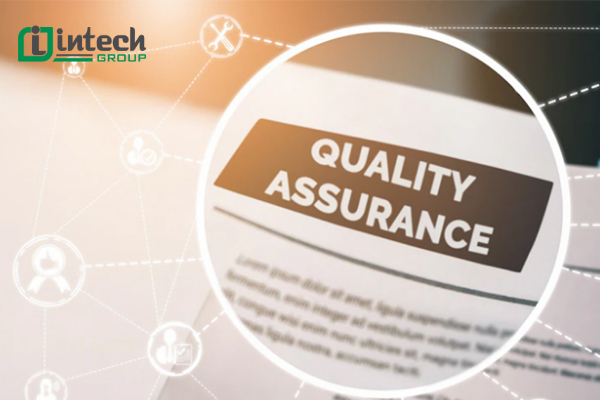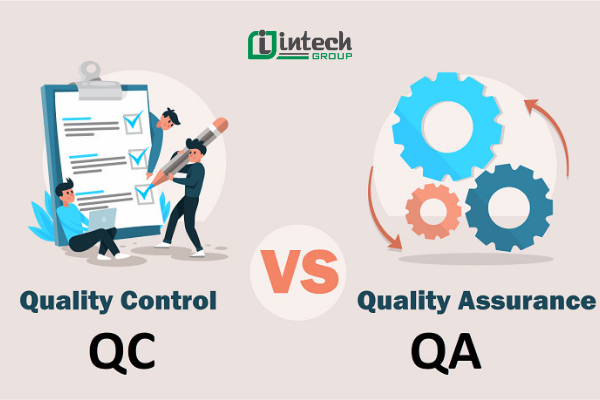What is QA? Distinguishing between QA and QC
13-10-2025 3
In the world of technology and manufacturing, a poor experience can turn customers away. This is where QA (Quality Assurance) and QC (Quality Control) play a vital role in ensuring products meet the highest standards.
1. What is QA?
QA (Quality Assurance) is the process of ensuring product quality by strictly controlling production processes, from research, development to testing. QA's tasks do not stop at testing, but also include:
- Researching new technologies, tools, and testing processes.
- Cooperating with stakeholders to reduce risks and ensure the best quality products.

1.1 The role of QA
QA not only helps businesses save time but also improves efficiency and protects brand reputation. Some typical roles include:
- QA helps detect errors early in the development process, minimizing repair costs and avoiding complex problems later.
- QA predicts and prevents potential errors, avoiding product releases with problems or negative user experiences.
- Ensure that additional features do not affect security and user experience (UX), making the product more scalable.
1.2 QA staff job description
- QA staff is responsible for building and maintaining the quality assurance system. Some of the main tasks include:
- Establishing and developing quality management standards such as ISO 9001 or ASME.
- Periodically evaluating and improving the quality management system.
- Updating new standards to suit market needs.
- Working closely with QC (Quality Control) and the production department to monitor product quality from start to finish.
- Proposing solutions to improve the quality management system.

1.3 Job positions in QA
QA (Quality Assurance) is increasingly becoming a field with a large demand for human resources, helping businesses ensure product quality and optimize user experience. Below are common job positions in the QA field:
QA staff
This is a basic position in the QA field, responsible for testing product quality during the production, software development or service process.
QA/Tester
QA/Tester performs testing of product or software functions and performance, ensuring there are no errors before the product is launched.
QA Engineers
QA Engineers (Quality Assurance Engineers) are responsible for performing testing, managing processes and ensuring products/services meet quality standards.
QA Supervisor
QA Supervisor is the person who manages and guides quality testing activities in the enterprise, ensuring that all processes are performed according to standards.
QA Manager
The QA Manager position is responsible for managing all quality assurance activities, developing testing strategies and making important decisions related to product quality.
1.4 What majors are suitable to study to become a QA?
To become a QA employee, you can choose the following majors:
-
Computer Science
-
Information Technology
-
Computer Applications
-
Business Administration

According to statistics, 66% of QA staff have a bachelor's degree, 16% have a master's degree, and 10% have an associate's degree. However, some QA staff do not need a formal degree but can learn through specialized training courses, industry certificates or accumulate practical experience.
To be successful in the QA field, in addition to knowledge of quality management, you need to have a deep understanding of the business's products/services and constantly improve your professional skills.
1.5 QA in software, IT, construction
QA in software
Software quality assurance (SQA) is a systematic process to detect, prevent errors and improve the software development cycle. Fixing coding errors can lead to unwanted risks, such as fixing one problem but affecting other features.
SQA helps developers minimize errors from the beginning, saving time and costs. However, even with an SQA process, a software update can still introduce bugs. Development methodologies such as Waterfall, Agile, and Scrum were born based on the SQA principle to optimize software performance and quality.
QA in IT
QA engineers in the information technology field ensure that software operates stably, reliably, and limits technical debt. They apply many testing techniques and processes to maintain quality throughout the product development lifecycle.
QA in Construction
QA/QC in construction plays an important role in ensuring quality and construction progress. Quality inspection and control are key factors in maintaining construction standards and minimizing errors.
2. What is QC?
QC (Quality Control) or quality control is an important part of manufacturing and service businesses. QC's role is to check and review product quality at different stages: input, production process and output before the product reaches the customer. QC uses modern techniques and technology to ensure that the product meets quality standards. This role not only helps to optimize product quality but also protects the reputation of the business.

2.1 The role of QC
QC is responsible for monitoring and checking product quality, with the aim of detecting and correcting errors in production. The main roles include:
Ensuring products meet quality standards: Measuring and checking parameters such as humidity, weight, temperature to determine whether the product meets standards.
Detecting and handling product errors: QC helps businesses minimize risks from defective products, protecting brands from quality-related liabilities.
Increasing production efficiency: By testing at multiple stages, QC detects problems, proposes improvement solutions, minimizes errors and improves process efficiency.
2.2 Job description of QC staff
QC specialists perform many different tasks to ensure product quality, including:
- Reading designs and specifications to understand production requirements.
- Monitor production processes and recommend adjustments as needed.
- Inspect and test materials and products to ensure quality.
- Operate inspection equipment and software.
- Report inspection and testing results with specific parameters such as temperature, humidity, weight, etc.
- Remove substandard products and propose solutions for improvement.
2.3 Job positions in QC
Manual QC
Manual quality inspectors perform direct inspections, record results, and propose solutions for improvement. No programming skills required.
Automation QC
Automation inspectors set up and run automated testing tools in specific stages. This position requires programming knowledge.
3. QA & QC application areas
IT field
QA & QC ensures that software meets quality standards (ISO, CMMI), reduces errors, increases system stability and scalability.
Food
Controls production, packaging, and transportation processes to meet food safety and hygiene standards, protecting consumers.
Construction
QC checks the quality of materials, construction, and maintenance; QA analyzes designs and predicts risks to ensure projects meet sustainable and safe standards.

Garment
QC checks the quality of raw materials, production processes and finished products; QA evaluates designs to ensure products meet quality and aesthetic standards.
Pharmaceuticals
QC and QA ensure pharmaceutical products meet strict standards from research to production and distribution, protecting the health of consumers.
4. Required skills of QA and QC staff
Careful, meticulous
QA and QC staff need to pay attention to the smallest details in the working process. Even small errors can seriously affect the entire production chain, so they require high care and meticulousness.
Patience
Quality control work requires performing steps repeatedly to ensure accuracy. Staff need to persistently find errors and root causes to come up with effective improvement solutions.
Communication skills
As a bridge between departments, QA and QC staff need good communication skills to exchange information, discuss and solve problems that arise during the working process.
Time management skills
Staff need to know how to arrange and prioritize work to ensure that tasks are completed on time without affecting production progress.
Observation skills
QA and QC staff need to have sharp observation skills, pay attention to the smallest details to detect problems and make accurate assessments.
Continuous learning
With new technology and standards constantly changing, QA and QC staff need to update their knowledge and improve their expertise to meet job requirements.
Honesty
Honesty in reporting test results, detecting errors and providing improvement solutions is an important factor in building trust within the organization and with customers.
5. Distinguishing QA and QC
| Criteria | QA (Quality Assurance) | QC (Quality Control) |
| Concept | Product Quality Assurance | Quality Control |
| Quality Control | Focus on the process | Focus on the end product |
| Time | Perform before production | Perform after production |
| Goal | Prevent errors, improve the process | Detect errors and fix them |
6. The role of QA and QC in production

Minimize errors
QA and QC processes help detect errors early and provide improved solutions to minimize risks in production.
Meet quality standards
Ensure products comply with industry regulations and quality standards.
Enhance business reputation
Strict inspection processes help businesses build trust and enhance brand image.
Optimize costs
Detecting errors in a timely manner helps save repair costs and reduce production losses.
QA and QC play an essential role in all areas of production and service, helping to ensure high-quality products, meet customer needs and enhance business reputation. Investing in QA and QC not only brings short-term benefits but also creates sustainable value for businesses.
Reference:

